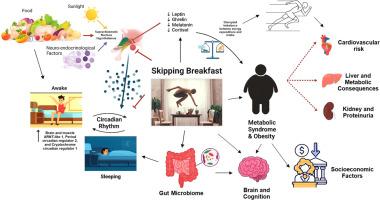Skipping breakfast and its wide-ranging health consequences: A systematic review from multiple metabolic disruptions to socioeconomic factors
IF 3.1
3区 医学
Q2 NUTRITION & DIETETICS
引用次数: 0
Abstract
Skipping breakfast has been widely debated due to its potential health consequences across multiple domains. This systematic review evaluates literature from 2010 to 2025, analyzing 66 studies to assess its associations with obesity, diabetes, gut microbiome alterations, neurodegenerative diseases, cancer, sports performance, psychiatric disorders, cognitive health, and socioeconomic factors. The hypothesis suggests that breakfast omission is linked to various adverse health effects. Evidence highlights associations with obesity and weight gain due to altered hormonal responses influencing hunger and energy balance. Additionally, skipping breakfast negatively affects gut microbiota, contributing to systemic inflammation and metabolic dysfunction. Research suggests potential links to increased cancer risk through inflammatory pathways, while cognitive decline, mood disorders, and impaired athletic performance are also observed. Psychiatric disorders, including anxiety and depression, may be exacerbated by irregular meal patterns, influencing neurotransmitter regulation. Emerging studies indicate that breakfast consumption plays a role in bone mineral density, as prolonged fasting periods may affect calcium metabolism and skeletal health. Socioeconomic disparities impact breakfast consumption, affecting diet quality and overall health outcomes. While some individuals experience neutral or even beneficial effects, meal timing and caloric distribution play critical roles in metabolic and cardiovascular health. However, causality remains complex due to confounding factors like diet quality, physical activity, and socioeconomic status. Current studies face limitations, including small sample sizes and short intervention periods, requiring further research to refine conclusions and explore long-term mechanisms behind breakfast omission’s health impacts.

不吃早餐及其广泛的健康后果:从多种代谢紊乱到社会经济因素的系统回顾
不吃早餐由于其潜在的健康后果在多个领域引起了广泛的争论。本系统综述评估了2010年至2025年的文献,分析了66项研究,以评估其与肥胖、糖尿病、肠道微生物组改变、神经退行性疾病、癌症、运动表现、精神障碍、认知健康和社会经济因素的关系。该假设表明,不吃早餐与各种不利的健康影响有关。有证据表明,肥胖和体重增加与影响饥饿和能量平衡的激素反应改变有关。此外,不吃早餐会对肠道微生物群产生负面影响,导致全身炎症和代谢功能障碍。研究表明,炎症途径可能与癌症风险增加有关,同时还观察到认知能力下降、情绪障碍和运动表现受损。精神疾病,包括焦虑和抑郁,可能因不规律的饮食模式而加剧,影响神经递质调节。新出现的研究表明,早餐消费在骨矿物质密度中起作用,因为长时间禁食可能会影响钙代谢和骨骼健康。社会经济差异影响早餐消费,影响饮食质量和整体健康结果。虽然有些人会经历中性甚至有益的影响,但进餐时间和热量分配在代谢和心血管健康中起着关键作用。然而,由于饮食质量、身体活动和社会经济地位等混杂因素,因果关系仍然很复杂。目前的研究存在局限性,包括样本量小、干预期短,需要进一步的研究来完善结论,并探索不吃早餐对健康影响的长期机制。
本文章由计算机程序翻译,如有差异,请以英文原文为准。
求助全文
约1分钟内获得全文
求助全文
来源期刊

Nutrition Research
医学-营养学
CiteScore
7.60
自引率
2.20%
发文量
107
审稿时长
58 days
期刊介绍:
Nutrition Research publishes original research articles, communications, and reviews on basic and applied nutrition. The mission of Nutrition Research is to serve as the journal for global communication of nutrition and life sciences research on diet and health. The field of nutrition sciences includes, but is not limited to, the study of nutrients during growth, reproduction, aging, health, and disease.
Articles covering basic and applied research on all aspects of nutrition sciences are encouraged, including: nutritional biochemistry and metabolism; metabolomics, nutrient gene interactions; nutrient requirements for health; nutrition and disease; digestion and absorption; nutritional anthropology; epidemiology; the influence of socioeconomic and cultural factors on nutrition of the individual and the community; the impact of nutrient intake on disease response and behavior; the consequences of nutritional deficiency on growth and development, endocrine and nervous systems, and immunity; nutrition and gut microbiota; food intolerance and allergy; nutrient drug interactions; nutrition and aging; nutrition and cancer; obesity; diabetes; and intervention programs.
 求助内容:
求助内容: 应助结果提醒方式:
应助结果提醒方式:


